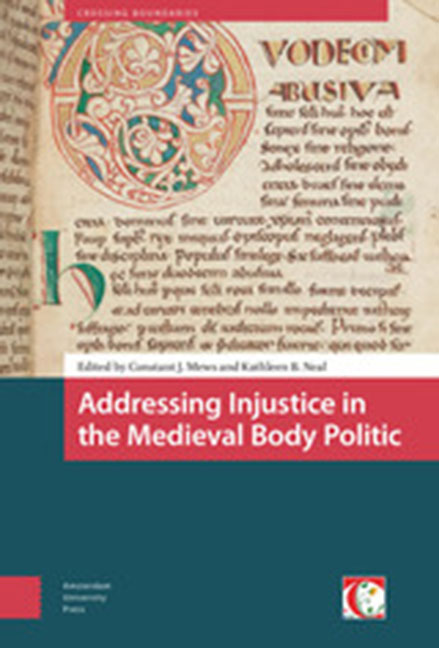Book contents
- Frontmatter
- Contents
- Acknowledgements
- Abbreviations
- Note on References
- List of Tables and Illustrations
- Introduction: Justice and its Abuse in the Medieval Body Politic
- 1 The De XII abusiuis saeculi: Contexts and Textual Traditions
- 2 The Irish Background to the De XII abusiuis saeculi
- 3 ‘Each in the Calling to Which They are Called’: Images of Authority in the De XII abusiuis saeculi
- 4 Transforming Irish Traditions: De XII abusiuis saeculi and Justice in the Frankish World, c. 750–1050
- 5 The Unjust King and the Negligent Bishop: Addressing Injustice in Eleventh and Twelfth-Century England and Germany
- 6 Reflecting on Abuses in Religious Life: From The Twelve Abuses of the Cloister to The Cloister of the Soul
- 7 Preaching the Body Politic: John of Wales and Franciscan Political Thought in the Late Thirteenth Century
- 8 Justice and Its Abuses in the Speculum justiciariorum
- 9 Addressing Abuses and Injustice in the Court of Philip the Fair: The De informatione principum of Durand of Champagne
- 10 ‘Perfect Justice Weighs Everything on a Balanced Scale’: Italian Friars on Equity, the Common Good, and the Commune c. 1270–c. 1310
- 11 Some Late Franciscan Rewritings of the Twelve Abuses
- Appendix: On the Twelve Abuses of the Age A Translation
- Bibliography
- Index of Biblical References
- Index of Manuscripts
- General Index
7 - Preaching the Body Politic: John of Wales and Franciscan Political Thought in the Late Thirteenth Century
Published online by Cambridge University Press: 14 February 2024
- Frontmatter
- Contents
- Acknowledgements
- Abbreviations
- Note on References
- List of Tables and Illustrations
- Introduction: Justice and its Abuse in the Medieval Body Politic
- 1 The De XII abusiuis saeculi: Contexts and Textual Traditions
- 2 The Irish Background to the De XII abusiuis saeculi
- 3 ‘Each in the Calling to Which They are Called’: Images of Authority in the De XII abusiuis saeculi
- 4 Transforming Irish Traditions: De XII abusiuis saeculi and Justice in the Frankish World, c. 750–1050
- 5 The Unjust King and the Negligent Bishop: Addressing Injustice in Eleventh and Twelfth-Century England and Germany
- 6 Reflecting on Abuses in Religious Life: From The Twelve Abuses of the Cloister to The Cloister of the Soul
- 7 Preaching the Body Politic: John of Wales and Franciscan Political Thought in the Late Thirteenth Century
- 8 Justice and Its Abuses in the Speculum justiciariorum
- 9 Addressing Abuses and Injustice in the Court of Philip the Fair: The De informatione principum of Durand of Champagne
- 10 ‘Perfect Justice Weighs Everything on a Balanced Scale’: Italian Friars on Equity, the Common Good, and the Commune c. 1270–c. 1310
- 11 Some Late Franciscan Rewritings of the Twelve Abuses
- Appendix: On the Twelve Abuses of the Age A Translation
- Bibliography
- Index of Biblical References
- Index of Manuscripts
- General Index
Summary
Abstract
This chapter explores how John of Wales, OFM, integrated extensive citation from the De XII abusiuis saeculi with Stoic thought in the tradition of John of Salisbury to generate a new vision of the Christian body politic in his popular manual for preachers, the Communiloquium. Unusually, he prioritized the twelfth abuse, a people without law, rediscovering the original social emphasis of the Twelve Abuses. John probably encountered the Twelve Abuses in the context of the baronial rebellion in mid-thirteenth century England, but used it to encourage guided conversation as a means of promoting moral and socio-political reform, rather than advocating violence. The popularity of his Communiloquium may have promoted wider acquaintance with the Twelve Abuses in the later Middle Ages.
Keywords: Abuses, body politic, Communiloquium, John of Wales, reform, Preaching
When John of Wales, OFM (d. c. 1285), began work on his Summa collectionum siue communiloquium (henceforth Communiloquium), probably sometime in the early to mid- 1260s prior to his move to Paris in c. 1270, he certainly had in mind his recent role as lector of the Oxford Franciscans (c. 1259–1262). It was the second and longest of his four major works, going on to become the most widely circulated of them all. Close to 150 manuscripts and two incunable recensions in several editions are known to survive. As the author tells us, its chief purpose was as a manual for preachers, providing materials suitable to instruction of all parts of society in any circumstance from formal preaching to informal conversation. As a committed pedagogue, John was aware that not all Franciscan students had access to the scale of library materials that Oxford or Paris could provide. He was anxious to produce a compilation of classical, biblical, and medieval quotations that furnished instructive moral exempla and equipped friars with conversation materials for the dining tables of the elite. His intellectual emphases earned him a place among Beryl Smalley's ‘classicizing friars’, and he has garnered recognition in some circles as a promoter of the work of John of Salisbury through his extensive citation of the Policraticus (1156–1159), from which he evidently drew inspiration. But his importance as an independent thinker and as a transmitter of knowledge on moral political questions has not yet been fully appreciated.
- Type
- Chapter
- Information
- Addressing Injustice in the Medieval Body Politic , pp. 201 - 232Publisher: Amsterdam University PressPrint publication year: 2023



